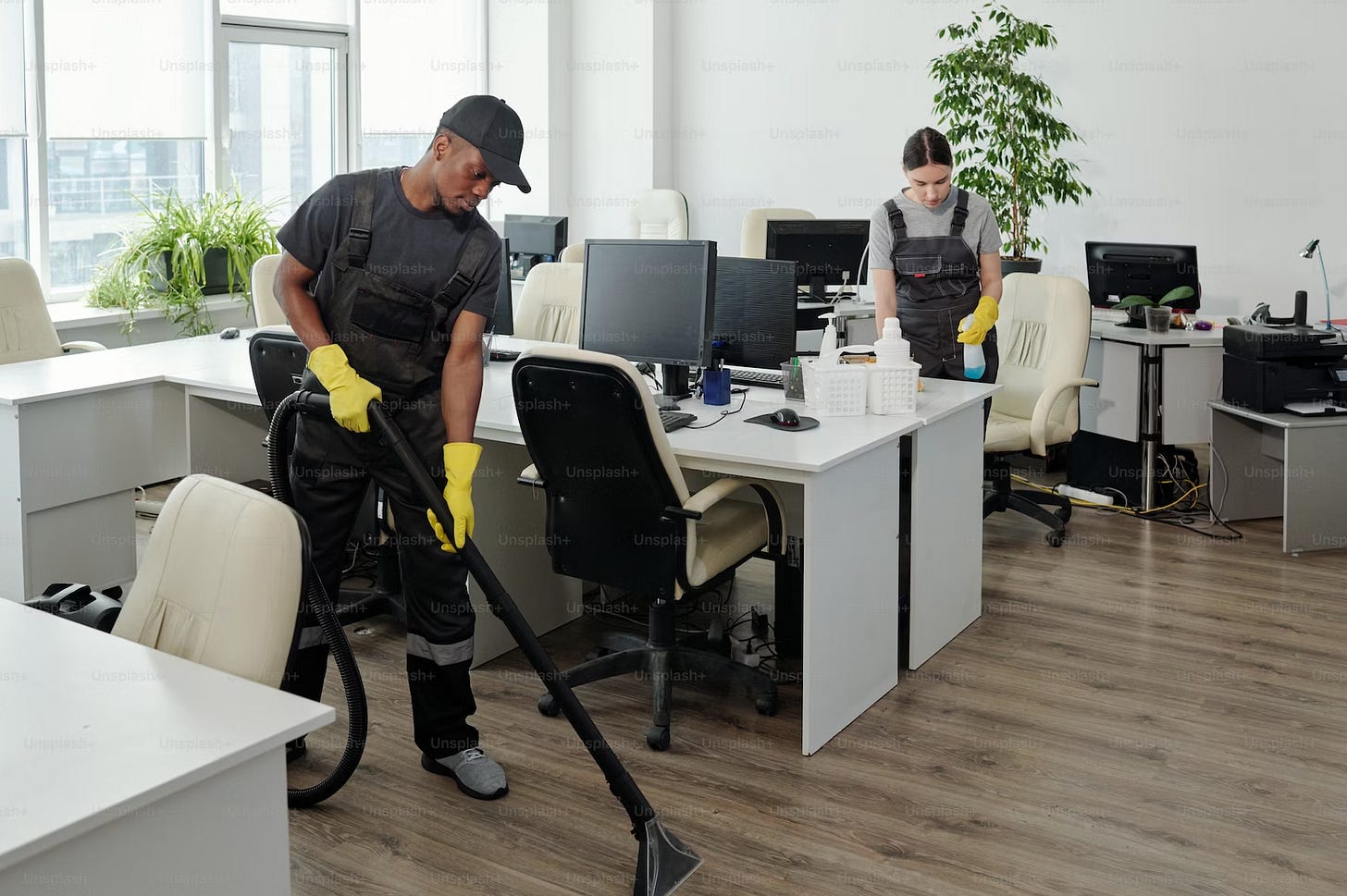1. Choose your target market
Your first step should be identifying your target market.
Office or Retail?
Education or Healthcare?
Hospitality or Local Government?
To reach a decision, you need to research your location and carry out an assessment of the best possible clients for your service.
The most common markets for commercial cleaning include:
Offices - Professional services
Retail - Stores and shopping centres
Medical - Doctors and Dentists practices
Education - Nurseries, Schools and Colleges
Hospitality - Bars, Nightclubs, Hotels, B+Bs
2. Choose a Legal Structure
There are 3 different business structures to consider for your cleaning business:
Self Employed/Sole Proprietor
Partnership
Limited Liability Company
I’m not in a position to offer legal advice so you’ll need to research the pros and cons of each in your jurisdiction.
To give you an idea, the cleaning businesses I’ve set up, (and those that we work with at The Growth Lab) are Limited Liability Companies.
3. Choose a Business Name
You want a name that sounds professional, is easy to remember and isn’t already in use.
One option would be to choose a name that reflects the type of service you offer, like “Premier Office Cleaning”.
Or you could choose something more abstract like “GreenFox Cleaning”.
For more ideas, here are 400+ cleaning company names to help you get started.
Once you’ve chosen a name, you’ll need to register your business for tax purposes.
United Kingdom: Register as a sole trader or business partnership, make sure your name is available and not trademarked, and register your company name.
United States: Check to see if anyone else in your state is using the same name, then trademark your small business name and register your domain name.
Canada: Register your trade name and trademark it to protect your brand. If your business entity has the same name as you, you don’t need to register it.
Check and make sure that your business is compliant with all necessary requirements.
4. Open a Business Bank Account
Regardless of your legal structure, it’s a good idea to open a bank account for your business.
This will make your business look legitimate to clients and simplify your taxes.
You might decide to get a business credit card to access funding and build a credit history for your business.
Either way, you also want to invest in accounting software like Xero or QuickBooks to track your income and expenses.
Even at this early stage, you should be preparing for taxes. Once you start generating revenue you’ll need to file accounts and pay tax.
It’s a good idea to get an accountant who can help with filings and give advice on financial decision like buying new equipment, renting office space or pension plans.
5. Get Commercial Cleaning Business Insurance
Deciding what insurance you for your cleaning business is important.
You’ll be operating at clients premises out of hours with potentially toxic materials. There’s always a risk that something could get broken or someone gets injured. These costs will come out of your pocket if you don’t have insurance.
The three main policies you need are:
Professional Indemnity Insurance, which covers costs for rectifying mistakes and invalid claims from unhappy clients. It also provides protection against things like defamation, infringement of intellectual property rights and loss of documents.
Public Liability Insurance, which covers your business in the event of death or injury to someone or damage to their personal property.
Employers Liability Insurance, which covers compensation payable to employees for injury or illness because of the work they did for your business.
The annual cost of commercial cleaning business insurance will depend on the level of liability cover you choose (£2m/£5m/£10m+).
Minimum cover includes:
General liability insurance in case of property damage or bodily harm
Commercial property insurance for damage to your equipment or place of business
Business income insurance to keep cash flowing after an incident or disaster
You can also add extra cover, including:
Commercial auto insurance if you drive a company car or truck
Workers’ compensation insurance in case an employee is injured on the job
Professional liability insurance for claims and lawsuits over professional mistakes
Employment practices liability insurance for employee-related claims
Crime insurance in case of criminal activity like theft or vandalism
Cyber liability insurance in case of a security breach or data leak
Key person insurance to keep the business going if you physically can’t work anymore
Commercial umbrella insurance for extra coverage on top of your other policies
Always shop around for the right insurance plan by checking out various insurance providers.
6. Cleaning Products, Materials and Equipment
When I started my cleaning business, I spent a lot of unnecessary cash on items that were hardly used in the 8 years I ran my business.
Don’t make the same mistake I did.
There’s a handful of core tools you need to get started. You can always add to these as you pick up more contracts and identify the new requirements.
Looking back at my mistake, the basic equipment I needed to get started was:
Commercial vacuum cleaner
Mop and bucket
Spray bottles
Microfiber cloths
Sponges, magic erasers
Glass/window cleaner and squeegee
Multi-purpose cleaner
Toilet cleaner
Limescale remover
Washing up liquid
Bin bags (large + small)
Rubber gloves
Extension lead
As you win more contracts, some sites will have equipment you can use and other sites you need to invest in buying more equipment.
Buy your tools from a janitorial wholesaler. You get professional grade products, equipment and material at better prices instead of buying consumer products from the supermarket.
BONUS: If you have a van or a car to transport your tools between jobs it’s easier to manage your start up costs. If you don’t have a vehicle, getting one will be a big additional cost.
I used to hire a Zipcar when I got started because I didn’t have a vehicle. It was useful in the short term but not very economical - especially when I got fined for returning the cars late!
7. Marketing Your Commercial Cleaning Business
Now that you’ve established your business, you need some clients.
In the beginning, my target market was real estate agents in North West London. My approach was simple, I created a list of agents in the area and spent my lunch hour making cold calls. I followed up those calls with emails.
That was it.
Website, ads, email marketing, creating content, flyers, brochures and the rest became part of my marketing strategy as the business grew.
But, to get started I used the phone and email.
If I had to start again, there are two things I would do differently:
Set up a website at the same time as making calls. You want to direct people somewhere to gain credibility.
Build a profile on LinkedIn and build a network.
You. might decide to create a marketing strategy that includes:
Using social media, channels TikTok, Facebook and Instagram, to build awareness
Paid ads on social media or Google
Networking and handing out business cards
Door drops, flyers and leave behinds
Business directory listing on Google Business or Bark
Collecting reviews to boost your visibility on Google or Facebook
A referral program that rewards your network, and soon to be clients, for referring new business
All of these work and they each require time and investment. Choose 2 or 3 channels to get started and build some momentum.
For me, I’d still choose the phone, email and LinkedIn above all other channels even now.
That’s where I believe you get the best results.
8. Set your prices
How much should you charge for your service?
Research the market and find out what your competitors are charging. That will give you a guideline.
But, pricing your services this way puts you in a race to the bottom.
Think about how can your provide more value to your target market?
Figuring this out will enable you to offer a service that stands apart from the competition and puts you in a category of 1.
Clients won’t be able to compare you service to others, which means you can charge a higher price.
When it comes to pricing, here are some options for your to consider:
Hourly rate - this includes your labour costs per hour plus overhead. Hourly rates are good to use as an estimate when you’re unsure how long a clean will take. The average rate in the UK is between £20-£30 per hour.
Square footage rate - this a common rate in the US. This rate adds up in large spaces. The average rate in the US is between $0.07–0.12 per square foot.
Flat rate - this works when you know exactly how much time it takes to complete a job and can price one predictable cost. More commonly used for STR/Deep Cleans and Tenancy cleans.
You’ll need to factor different features into your pricing, like floor types, how many bathrooms, internal glass, the number of desks and employees in the building.
That’s why a site visit is always important to confirm what you need to clean and how much to charge.
9. Hiring Staff to Build Your Team
When you start your commercial cleaning business, you might be the only person doing all the jobs - cleaning, quoting, scheduling and invoicing.
That was me, before I found my first hire - a team of cleaners.
Ask your network and advertising on Indeed, LinkedIn, Facebook and your own website is a must.
Speak with other cleaners and ask if they know people looking for work.
As you build your cleaning staff, you can identify a supervisor who’s responsible for training, scheduling teams and dealing with day to day issues.
You need office support, either a VA or an office manager to handle admin, send invoices and organise payroll.
Perhaps you hire a bookkeeper to manage expenses while your accountant files the taxes.
This core team should free up enough time for you to focus on winning new business until you can add a sales person to the team to focuses on finding more clients.
As you build your team and grow your business, you can start taking a step back and work on the business instead of in it.
Content to check out
This week’s episode of The Growth Lab podcast is a repost of my interview on the DayPorter podcast with James and Angel. We dive into a bunch of topics including the importance of partnerships, how to apply Alex Hormozi’s $100m Offers to your cleaning business and developing a CEO mindset. Listen here.
Prefer watching over listening? Check out The Growth Lab podcast on YouTube.
Need More Help?
Email me with the growth strategy for your cleaning business. The more details you provide, the more personal I can make my response.
Want to increase your revenue by £250K/mo in 12 months? Book a call.
Thanks for reading!
Matt @ The Growth Lab
Forwarded this email?
Subscribe here:
Thanks for subscribing to The Growth Lab.







